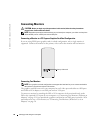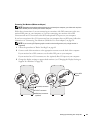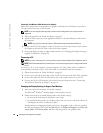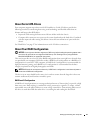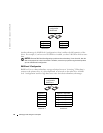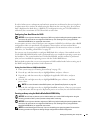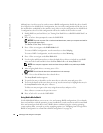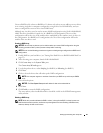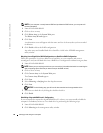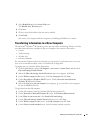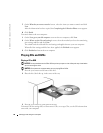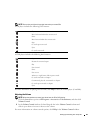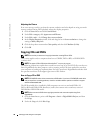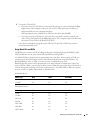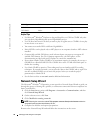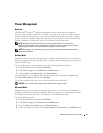
26 Setting Up and Using Your Computer
www.dell.com | support.dell.com
NOTE: If your computer currently boots to RAID and you delete the RAID volume, your computer will
become unbootable.
1
Launch Nvidia MediaShield.
2
Click to select an array.
3
Click
Delete Array
in the
System Tasks
pane.
The
Delete Array Wizard
appears.
4
Click
Next
.
A confirmation screen will appear with the name and size of the array that you have marked
for deletion.
5
Click
Finish
to delete the RAID configuration.
Any other arrays and installed hard drives should be visible in the NVRAID management
utility window.
Morphing from a Single Drive RAID 0 Configuration to a Dual Drive RAID Configuration
Follow this procedure if you have added a new hard drive to your computer and want to
reconfigure it and your old hard drive into a RAID level 1 configuration without losing any data.
1
Launch Nvidia MediaShield.
NOTE: Select your pre-existing hard drive as your source drive (it should be the hard drive containing the
data or operating system files that you want to keep on the RAID volume).
2
Click to select an array.
3
Click
Convert Array
in the
System Tasks
pane.
The
Convert Array Wizard
appears.
4
Click
Next
.
5
Select
Mirroring
or
Striping
from the drop-down menu.
6
Click
Next
.
NOTICE: In the following step, you will lose all data contained on the target member drive.
7
Select the new hard drive by clicking the checkbox beside it.
8
Click
Finish
.
Rebuilding a Degraded RAID Level 1 Configuration
If your computer has reported a degraded RAID level 1 volume, you can manually rebuild the
computer’s redundancy mirror to a new hard drive by performing the following steps:
1
Launch Nvidia MediaShield.
2
Click
Mirroring
in the management utility window.



